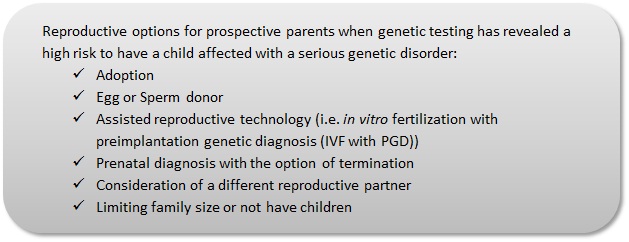Reproductive genetic carrier screening: beyond family history and ethnicity

Point of Care tool 1& 2: Pre- and Post- test tips for clinicians when ordering expanded carrier screening (Nov 2024)
Point of Care tool #1: Tips to for clinicians BEFORE (pre-test) ordering expanded carrier screening. (Nov 2024)
Point of Care tool #2: Tips to for clinicians AFTER (post-test) ordering expanded carrier screening. (Nov )2024)
NOTE: For a case-based education module check out the updated (June 2017) module here.
The intent of reproductive genetic carrier screening is to facilitate informed decision-making by future parents through identifying those couples at increased risk of having an affected child with a serious genetic disorder (autosomal or X-linked recessive)1-3. The ideal timing for discussing carrier screening is when prospective parents are considering pregnancy (preconception) or at a woman’s first prenatal visit, regardless of gestational age.4

Current Canadian and international practice guidelines support offering carrier screening based on an individual’s ethnic background and when certain personal and/or family history red flags are identified1,4,5. For Point of Care tools on Canadian recommendations for reproductive genetic screening, click the box below.
Expanded carrier screening
Expanded carrier screening refers to reproductive genetic carrier screening beyond one’s ethnicity and family history. Expanded carrier screening panels generally use next-generation sequencing to read through many (100+) genes at one time. Several professional societies have published recommendations for responsible implementation of expanded carrier screening into clinical practice1,4,5. A recent opinion update by the Society of Obstetricians and Gynaecologists of Canada and the Canadian College of Medical Geneticists on reproductive genetic carrier screening states that “the option of this technology should be part of the informed consent process”.4 Ordering providers are also cautioned that access to formal genetic counselling for their patients following ESC panel results may be limited4. Currently, expanded carrier screening panels are not funded through provincial health care. Interested individuals can pay out of pocket for this testing if a physician is willing to arrange testing.
We have developed two point of care tools to help providers who chose to arrange expanded carrier screening for their patients. One tool includes tips to consider before ordering expanded carrier screening testing and one tool contains tips to consider once expanded carrier screening results are reported.
Because offering expanded carrier screening panels is an evolving choice in clinical practice, if you have additional tips or advice for your fellow Canadian health care providers, please Contact Us.
References:
[1] Henneman L, Borry P, Chokoshvili D, et al. Responsible implementation of expanded carrier screening. Eur J Hum Genet 2016; 24(6):e1-e12.
[2] Plantinga M, Birnie E, Abbott KM, et al. Population-based preconception carrier screening: how potential users from the general population view a test for 50 serious diseases. Eur J Hum Genet 2016; 24(10):1417-23
[3] Yao R, Goetzinger KR. Genetic Carrier Screening in the Twenty-first Century. Clin Lab Med 2016; 36(2):277-88.
[4] Wilson RD, De Bie I, Armour CM, et al. Joint SOGC-CCMG Opinion for Reproductive Genetic Carrier Screening: An Update for All Canadian Providers of Maternity and Reproductive Healthcare in the Era of Direct-to-Consumer Testing. J Obstet Gynaecol Can 2016; 38(8):742-762
[5] Edwards JG, Feldman G, Goldberg J. et al. Expanded carrier screening in reproductive medicine-points to consider: a joint statement of the American College of Medical Genetics and Genomics, American College of Obstetricians and Gynecologists, National Society of Genetic Counselors, Perinatal Quality Foundation, and Society for Maternal-Fetal Medicine. Obstet Gynecol 2015;125(3):653-62.
–
Disclaimer:
· GECKO is an independent not-for-profit program that does not accept support from commercial or non-academic entities.
· GECKO aims to aid the practicing non-genetics clinician by providing informed resources regarding genetic/genomic conditions, services and technologies that have been developed in a rigorous and evidence-based manner with periodic updating. The content on the GECKO site is for educational purposes only. No resource should be used as a substitute for clinical judgement. GECKO assumes no responsibility or liability resulting from the use of information contained herein.
· All clinicians using this site are encouraged to consult local genetics clinics, medical geneticists, or specialists for clarification of questions that arise relating to specific patient problems.
· All patients should seek the advice of their own physician or other qualified clinician regarding any medical questions or conditions.
· External links are selected and reviewed at the time a page is published. However, GECKO is not responsible for the content of external websites. The inclusion of a link to an external website from GECKO should not be understood to be an endorsement of that website or the site’s owners (or their products/services).
· We strive to provide accurate, timely, unbiased, and up-to-date information on this site, and make every attempt to ensure the integrity of the site. However, it is possible that the information contained here may contain inaccuracies or errors for which neither GECKO nor its funding agencies assume responsibility.



